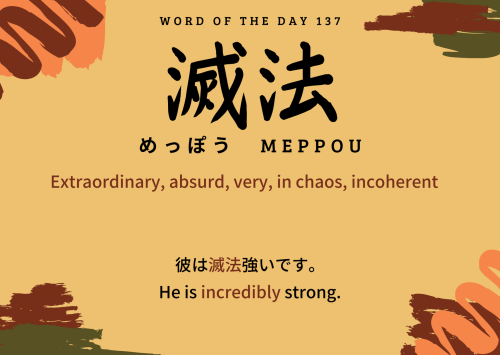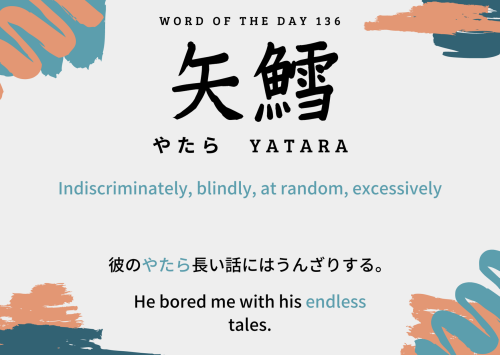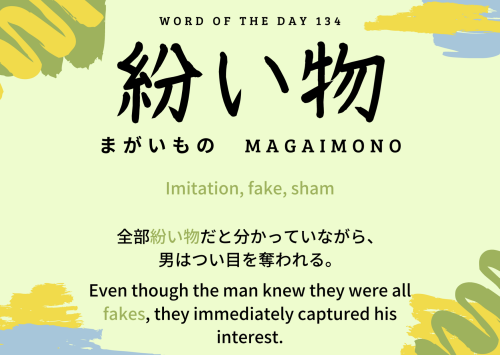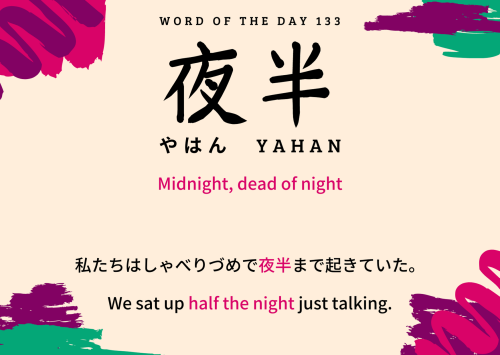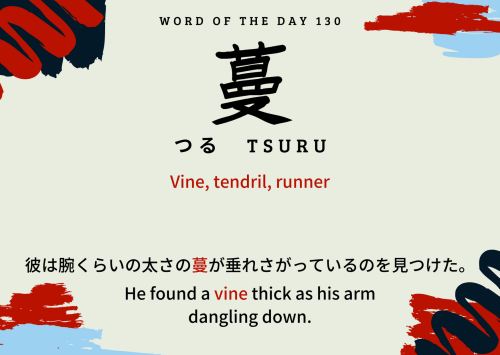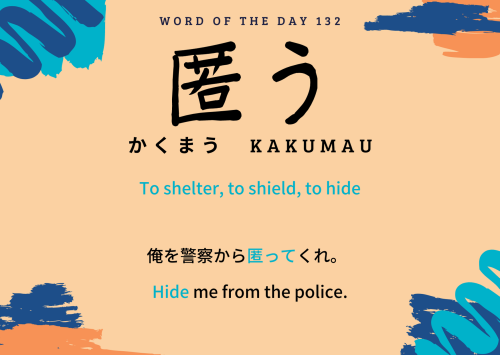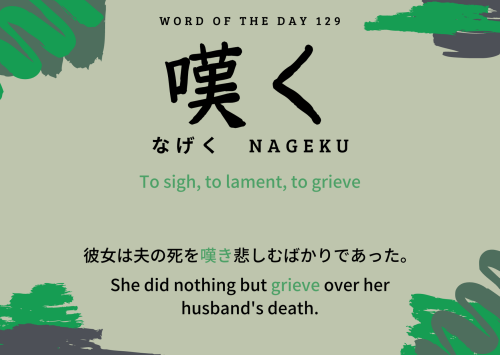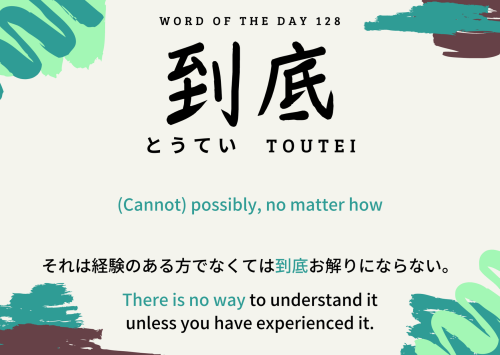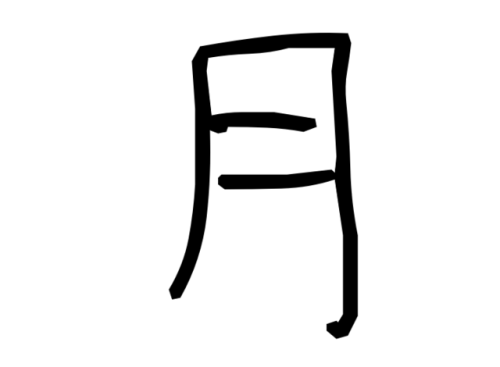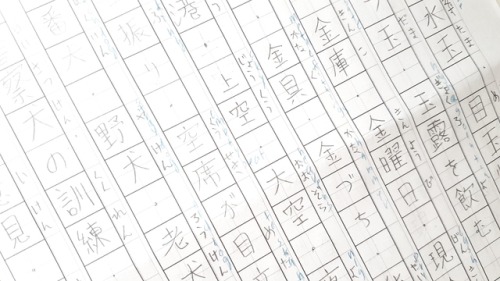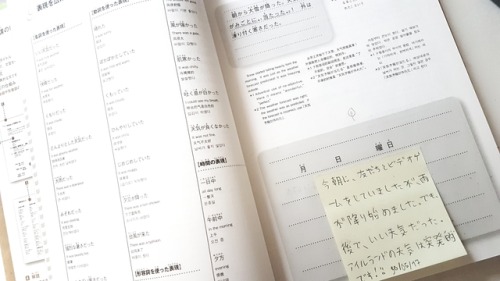#japanese studyblr
JLPT Level: Unlisted, but the kanji are N1 and N3 respectively.
Alright, this is a pretty interesting word that’s seen some changes in meaning and usage over the centuries.
滅
- On-yomi: metsu
- Kun-yomi: horo.biru, horo.bu, horo,bosu
- Meaning: destroy, ruin, overthrow, perish
法
- On-yomi: hou, ha, ho, furan
- Kun-yomi: nori
- Meaning: method, law, rule, principle, model, system
If we put the two together, we get “The Law of Destruction,” which could be a pretty rad metal song.
Originally, this was a Buddhist term used to refer to…something too hard for me to wrap my pea brain around haha. Really trying to remember everything I learned in that one Buddhist Philosophy course I took in uni back in the day.
Okay okay. Basically, all things in existence are divided into two categories:
- Conditioned existence (a.k.a. things created by fate). This is known as saṃskṛta in Sanskrit.
- Those that have transcended conditioned existence. This is known as asaṃskṛta in Sanskrit.
Meppou is the old Japanese Buddhist term for “things that have transcended conditioned existence.” This can mean that a thing has reached Nirvana, something that is “absolute.”
From that meaning, meppou came to mean something “extraordinary” or “terrible and intense” like a historic typhoon.
Most of the time, meppou is used in the phrase 滅法強い meppou tsuyoi, “terribly powerful.”
Post link
JLPT Level: N1, and the kanji are N1 and unlisted respectively.
Most of the time, this word is written in hiragana. But the kanji are funny, so I’m gonna talk about those too.
矢
- On-yomi: ya
- Kun-yomi: shi
- Meaning: dart, arrow
鱈
- On-yomi: setsu
- Kun-yomi: tara
- Meaning: codfish
So…put these two together and you get… “shooting codfish with arrows” and somehow that is supposed to mean “indiscriminately; blindly; at random; recklessly; thoughtlessly; excessively; profusely.”
I bet you’re ready for me to blow your mind with some anecdote from like 700 years ago about some old Japanese hermit who only had an arrow and spent everyday in the same stream trying to catch cod unsuccessfully, because he was an idiot and didn’t know that cod were an ocean fish and not a freshwater fish.
…But actually, these are just ateji. Ateji are kanji whose meaning have nothing to do with the word they are used in. Their pronunciation just conveniently matches the word. So “arrow” and “codfish” have absolutely nothing to do with yatara and its meaning.
Kanji, man. Can’t trust ‘em. :P
Post link
JLPT Level: Unlisted
This is one of the coolest words I have found to date. Look at those meanings!! To boast, to roar, to recite a poem to oneself. It’s so rich and nuanced! And then look at how dang cool the kanji looks!! Also, let’s not forget that the pronunciation, “usobuku” sounds like 嘘吹く (uso fuku, to tell lies like the wind blows), which is not a real expression but is immediately what my mind goes to.
Okay, let’s take a look at this kanji!
嘯
- On-yomi: shou, shitsu
- Kun-yomi: usobu.ku
- Meaning: roar, howl, recite emotionally, feign indifference
It appears that long ago, this kanji used to be used for whistling. But not just any whistling–this is for the whistling people did to imitate bird calls.
Nowadays, this word is very seldom used, and it is never used in reference to bird calls. But it’s really cool!
Post link
JLPT Level: Unlisted, but the kanji are N1 and N4 respectively.
Okay, this one is so low frequency you’ll probably never see it. But I like how it sounds so I’m gonna talk about it haha.
紛
- On-yomi: fun
- Kun-yomi: magi.reru, -magi.re, magi.rasu, magi.rawasu, magi.rawashii
- Meaning: distract, be mistaken for, go astray, divert
物
- On-yomi: butsu, motsu
- Kun-yomi: mono
- Meaning: thing, object, matter
So if we put these two together we get “something that one mistakes for something else.” Pretty easy to understand, I think. I wanted to talk about the etymology of the kanji 紛 but I couldn’t find anything. T-T
Post link
JLPT Level: Unlisted, but the kanji are N4 and N5 respectively.
This is a pretty low-frequency word. It sounds pretty old-timey, and it makes sense because I found it in a manga that takes place in the Edo Period haha.
Let’s take a look at the kanji:
夜
- On-yomi: ya
- Kun-yomi: yo, yoru
- Meaning: night, evening
半
- On-yomi: han
- Kun-yomi: naka.ba
- Meaning: half, middle, odd number, semi-, part-
Put them together and you get “the middle of the night.” Pretty easy, right?
Post link
JLPT Level: Unlisted
蔓
- On-yomi: man, ban
- Kun-yomi: habiko.ru, tsuru
- Meaning: vine, tendril, influence, connections, good offices, spread, sprawl, thrive, rampant, powerful
You’re very unlikely to see this kanji in a book, as they’d probably write it in katakana. However, this is sometimes used in last names.
You may recognize the ⺾ radical at the top. This is the “grass” radical and represents “plants.” The other three radicals, 曼, when put together like this, mean “long.”

Here we see the very original kanji for tsuru. At the top we have grass planted in a row. Beneath those we have a hat, followed by a hand, an eye, and another hand at the bottom. I’m not sure why there’s a “hat” here, but there is a hand above and below the eye to signify someone holding out their hands to gesture how tall or “long” something is.
So, something “long” 曼 plus “grass” ⺾ = vines. pretty easy!
Also, as a sidenote, most kanji with 曼 have an on-yomi of “man.”
Post link
JLPT Level: Unlisted, but the kanji is N1
This has an etymology different from what I had expected. Let’s look at the parts!
⼖ to conceal, hide
若 soft mulberry leaves
Now, anyone who has been studying their kanji is probably looking at that definition of 若 and going, “Omoi-no-hoka, you’ve lost the plot” because 若 means young.
And see, I knew that it meant “young” too, so I thought maybe this was a reference to something like “protect the women andchildren.”
But nope! This, my friends, is all in reference to silkworms.
Silk was an incredibly important textile in Japan. The silkworms live in mulberry trees, eating the young, soft leaves. 匿 represents the mulberry leaves that fill up the silkworms’ bellies and stay hidden there.
Kinda weird, but there ya go!
Post link
JLPT Level: Unlisted, but the kanji are N4 and N3 respectively.
While not a super common word, you do have a chance of hearing it in conversation once in a blue moon. It’s also incredibly easy to understand once you know the parts.
言い ii, to say
伝え tsutae, to communicate, transmit
So 言い伝え is something that is spoken and transferred from one generation to the next.
Post link
JLPT Level: N1
Three JLPT words in a row? What is happening?
Okay. I knew going in that this kanji wasn’t going to have a very cheerful etymology because of its meaning, but it’s way, way darker than I had imagined. Brace yourselves for some pretty morbid stuff.
嘆 is made of two parts: 口 (mouth) and 漢 without the ⺡. Generally, 漢 represents “China.” But not in this kanji. Ohhhhh no. Strap yourselves in.
In ancient Japan, many different sacrifices were made to different gods, and when there were famines due to drought, miko (Shinto shrine priestesses) were burned alive as human sacrifices.
The 漢 part of this kanji represents 旱魃 Kanbatsu, which can mean either “drought” or “the God of Drought.”
So if you put mouth 口 and the God of Drought 漢 without the ⺡together, you get, “a cry to the God of Drought.”
Nowadays, I would say that almost no Japanese people know about the dark rituals this kanji alludes to. This word is used most often for grieving or mourning, though, so there is still a connection to death.
Post link
JLPT Level: N1, and the kanji are N3 and N2 respectively.
Wow, two words that are on the JLPT in a row. Am I losing my edge?
Let’s break down the kanji:
到
On-yomi: tou
Kun-yomi: ita.ru
Meaning: arrival, proceed, reach, attain, result in
底
On-yomi: tei
Kun-yomi: soko
Meaning:bottom, sole, depth, bottom price, base, kind, sort
So we can put these two kanji together to get the literal meaning of “reaching the bottom.” How does that come to mean “cannot possibly,” or “no matter how”?
Well, I did some expert googling but was unable to find anything. :(
My personal opinion, though, is that it’s either of two things:
- “I am certain to the bottom of my heart that this is impossible.”
- Even if you reach down within yourself and do your best, it is impossible.”
Those are just guesses, and I’m not a native speaker, but that’s my take.
Post link
JLPT Level: N1
Aha!! At long last, a word that is on the JLPT haha.
I could only find one source that explained this kanji. Let’s see what it has to say.
Nowadays, this kanji is a combination of 月 (moon) and 危 (danger). However, the 月 radical can also refer to meat or flesh, and that is meaning it has in this kanji. 危 does mean danger, but actually, the original version of this kanji had 色 (color) there.
Buuuuut, the 色 didn’t actually mean “color” in this kanji. It was a pictograph of someone embracing another from behind.

…I can’t really see it, but I’ll believe you, book.
The book goes on to explain that this original version of moroi with 月 and 色 represented the sensation of touching another person. 脆 represented “softness, beauty, something with a pleasant texture.”
So it appears as though the kanji has a pretty different meaning from the adjective it’s used for, moroi, which means “fragile, brittle, or tender-hearted.”
But if you give it a really hard think, they are certainly connected. A central pillar of Japanese culture is appreciating the beauty of life, because all life is impermanent. So the beauty of a person, in particular, would be a fragile thing, especially back in the day when people had much shorter life spans. That likely gave birth to the “fragile, brittle” meaning.
And once the “fragile, brittle” meaning came to be, that metaphor was extended to people who “break down” into tears easily.
That was a rather winding explanation. Hope it made sense!
Post link
Language Exchange Discord: UPDATE #3
I spent probably 6 hours trying to get native speakers to join and one said he would another time. Ah, what a productive way to spend my day.
I can’t continue on like this, so I hope I can find a more efficient way of getting native speakers to join :/.
Other than that, I set up the english rules, did bot config, reaction roles etc. I even found my first learning assistant!
Please join if you guys are interested :). It’s for anyone who is learning english and/or japanese. I’m giving out special roles to people who are qualified to answer linguistic questions and to people who can get a certain number of members to join :)
This server isn’t a school server. We don’t offer classes or tutoring. It’s for language immersion. This is why i’m frustrated that Japanese people don’t want to join They will eventually dw about it cmon :3
10日目の単語
Hi guys! I am really going all over the place with this vocabulary, but I decided that I want to start learning the vocabulary for the podcast “Let’s Learn Japanese from Small Talk!” so I can listen more easily :) I will be making my vocabulary lists based off of textbook words, JLPT words, conjunctions, and the wordlists from the podcast!
addiction中毒(ちゅうどく)
self-introduction自己紹介(じこしょうかい)
program演目(えんもく)
last month 先月(せんげつ)
so, thereforeだから・なので
by the way ところで
for example 例えば(たとえば)
because何故なら(なぜなら)
butけど・けれども
disgusted with; to dislike 嫌い(きらい)
quiet静か(しずか)
very fond of; to love 大好き(だいすき)
livelyにぎやか
To really solidify my learning, I’m gonna take the words from these lists and make them into a big flashcard set with the Shirabe Jisho dictionary app! I’ll study it today too of course :)
I’m frustrated because I’m not learning my textbook words fast enough but we r trying… I’m gonna take a break to work on my new server :3
Words with the kanji 五
- 五円玉(ごえんだま): 5 yen coin
- 五月(ごがつ):May
- 五冊(ごさつ):5 books/ volumes
- 五番(ごばん):5th position, turn, sports matches
- 五本(ごほん):5 (long cylindrical things)
- 五名(ごめい):5 people (polite)
- 五日(いつか): the 5th day of the month
- 五人(ごにん):5 people
- 五枚買う(ごまいかう):5 thin, flat objects: sheets of paper, photographs, plates, articles of clothing
Post link
Learn Japanese with Anime - I’m So Upset I Could Die
Learn Japanese with Anime - I Have To Become A Hero!
Learn Japanese With Anime - Oh? You’re Approaching Me?
Learn Japanese with Anime - Volleyball Is A Sport Where You’re Always Lo…
Learn Japanese with Anime - What Do I Have To Fear?
Learn Japanese with Anime - Words Are Like Knives
Learn Japanese with Anime - How Does It Feel To Be Looked Down Upon By A…
Learn Japanese with Anime - We Have No Attachments In A World Where Shinnosuke Doesn’t Exist!
Learn Japanese With Anime I, Giorno Giovanna, Have A Dream
JLPT N5 Grammar - てください
Are you using it right??
How do you ask someone to do something without sounding like a teacher? Hint: not like this!
————-
Welcome to Benkyogo!
In our ぶんぽうご Real Japanese Grammar series, Nani and Mani are deep diving into the textbook grammar required for the JLPT, throwing out the stuff you’ll never use, and teaching you how to speak authentically whilst expressing your own personality.
⭕️ You WILL:
- Understand grammar in real life context- Be told when and where to forget the BS - Get to listen to 2 random people free-talking about Japanese grammar
❌ You WON’T:
- Sound boring when talking to your Japanese friends - Say anything rude to your Japanese boss - Speak like you’re fresh outta your favourite anime
We don’t claim to be experts, we’re just 2 Japanese speakers (one native, one second language) chatting about the DO’s and DON’T’s of Japanese grammar in the 21st century. Keep up, textbooks!!
————-
Check out https://benkyogo.co.uk/ for detailed hints, tips and resources to self-study Japanese.
⛩Check out our store at https://www.etsy.com/shop/benkyogo
JLPT N1 Grammar - かたがた
Are you using it right??
でも seems like a great way to say “but” BUT… there’s a big but. There are politer (and more native-sounding) ways to say BUT. Learn about all the buts on this episode of Bunpogo!
————-
Welcome to Benkyogo!
In our ぶんぽうご Real Japanese Grammar series, Nani and Mani are deep diving into the textbook grammar required for the JLPT, throwing out the stuff you’ll never use, and teaching you how to speak authentically whilst expressing your own personality.
⭕️ You WILL:
- Understand grammar in real life context- Be told when and where to forget the BS - Get to listen to 2 random people free-talking about Japanese grammar
❌ You WON’T:
- Sound boring when talking to your Japanese friends - Say anything rude to your Japanese boss - Speak like you’re fresh outta your favourite anime
We don’t claim to be experts, we’re just 2 Japanese speakers (one native, one second language) chatting about the DO’s and DON’T’s of Japanese grammar in the 21st century. Keep up, textbooks!!
————-
Check out https://benkyogo.co.uk/ for detailed hints, tips and resources to self-study Japanese.
⛩Check out our store at https://www.etsy.com/shop/benkyogo
JLPT N1 Grammar - かたがた
Are you using it right??
でも seems like a great way to say “but” BUT… there’s a big but. There are politer (and more native-sounding) ways to say BUT. Learn about all the buts on this episode of Bunpogo!
————-
Welcome to Benkyogo!
In our ぶんぽうご Real Japanese Grammar series, Nani and Mani are deep diving into the textbook grammar required for the JLPT, throwing out the stuff you’ll never use, and teaching you how to speak authentically whilst expressing your own personality.
⭕️ You WILL:
- Understand grammar in real life context- Be told when and where to forget the BS - Get to listen to 2 random people free-talking about Japanese grammar
❌ You WON’T:
- Sound boring when talking to your Japanese friends - Say anything rude to your Japanese boss - Speak like you’re fresh outta your favourite anime
We don’t claim to be experts, we’re just 2 Japanese speakers (one native, one second language) chatting about the DO’s and DON’T’s of Japanese grammar in the 21st century. Keep up, textbooks!!
————-
Check out https://benkyogo.co.uk/ for detailed hints, tips and resources to self-study Japanese.
⛩Check out our store at https://www.etsy.com/shop/benkyogo

